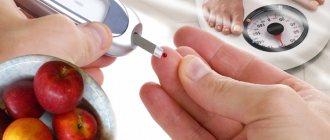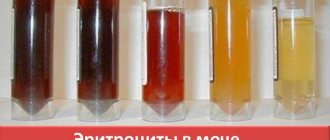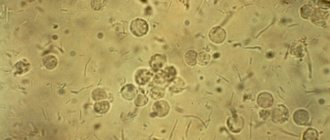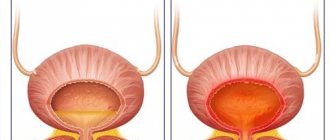Children's illnesses provoke terrible nervousness and confusion in parents. Particularly severe panic is caused by the ailments of newborns and young children (up to 6 years old). Children's illnesses are much easier if parents remain calm and take adequate actions.
Inflammation of the bladder, that is, cystitis, can occur at any age and in children of both sexes. However, due to anatomical features (short and wide urethra, proximity to the anus), girls are more predisposed to inflammation of the bladder.
Recent studies show that the likelihood of developing cystitis in childhood and adolescence in girls increases if the mother or other women in the family have experienced bladder inflammation.
What signs and symptoms indicate cystitis, what to do and what treatment is needed?
Reasons for development
How can a child become infected with cystitis? As a rule, a little girl’s body produces an insufficient amount of female hormones that can resist inflammatory processes. It follows that an older girl is less susceptible to cystitis due to normal hormonal levels that can protect her from infectious diseases.
But not only a hormonal imbalance in a child’s body can provoke the development of an illness; sometimes it is enough that the baby often suffers from vulvitis, vulvovaginitis or other similar diseases. Sometimes a baby’s low immunity can play a cruel joke when the child’s body is not able to independently cope with the occurrence of cystitis or another disease of the urinary system.
In addition to this, there are also other factors that provoke the disease in a little girl:
- if parents do not try to feed their child adequate nutrition;
- the baby has chronic diseases of internal organs;
- the cause of cystitis in girls may be hidden in the anatomy of their genitourinary system;
- the baby was born with congenital defects of the genitourinary system;
- the child does not receive enough vitamins;
- the girl’s body has endocrine disorders;
- the parents regularly treated the baby with medications, which caused a decrease in her immunity;
- the baby previously underwent surgery on the genitourinary system;
- penetration of the infection occurred against the background of psychological or physical trauma;
- cystitis manifested itself as a result of an allergic reaction to cosmetic preparations;
- the parents did not keep an eye on the baby during the walk, dressed her lightly and did not pay attention to the fact that the girl was sitting on cold concrete or the floor;
- the mother did not explain to the baby how to wash herself properly.
In addition to the above, cystitis in girls can occur with urethritis or pyelonephritis, when infection of the bladder occurs in a descending or ascending manner from areas affected by microorganisms. For this reason, parents, as a precaution, before starting treatment for the baby, are required to take her to an appointment with the attending physician to make a diagnosis.
As for newborns, cystitis in infants often occurs due to prolonged wearing of diapers, when parents do not promptly change them to fresh panties. As a result, a favorable condition is created for the proliferation of infections and bacteria freely penetrate into the cavity of the bladder, first entering the urethra and only then inside the body.
Complications
The most dangerous thing about cystitis is the possible complications.
The first and most serious complication is pyelonephritis. The infection travels upward through the ureters to the kidneys, where it remains, causing inflammation of the kidneys. Pyelonephritis is difficult to treat and is dangerous for a woman because even after achieving long-term remission, this disease worsens during pregnancy, increasing the risk of negative effects on the fetus.
Another serious consequence of cystitis can be vesicoureteral reflux. In a healthy body, fluid flows only in one direction, and urine is excreted.
With this complication, after inflammation of the bladder mucosa, the muscles can no longer empty the bladder correctly, and urine can be thrown back into the ureters. And this is dangerous because infected urine, entering the ureters, will cause an inflammatory process there.
One of the dangerous and irreversible complications of bladder inflammation is interstitial damage to its walls. Interstitial cystitis is an inflammation process that moves from the mucous membrane to the muscle layer and disrupts the functioning of the entire bladder as a whole.
The symptoms of this disease are the same as with acute cystitis, only the pain is much stronger, and its intensity increases depending on the fullness of the bladder itself. The urge to urinate is frequent and occurs spontaneously, disappearing immediately after emptying the bladder.
All complications are treated with antibiotics and physical therapy. But even despite the immediate start of therapy, there is a possibility of encountering complications in the future.
Monotherapy is always ineffective, that is, it will not be possible to treat only with antibiotics, warm baths or diuretic herbs and berries. All treatment must be comprehensive, and then there is a chance of recovery from this disease.
It is very important to consult a doctor at the first symptoms and follow all the doctor’s instructions - this is your duty towards the child and his health.
Inflammation of the bladder is a common ailment that mainly affects young girls and teenagers. Why does this happen, how to deal with the disease? This article reports on the causes of cystitis in children, the symptoms of the disease that affects girls, and methods of treating it.
How to determine a disease in a child
Sometimes even experienced parents cannot understand the reason why the baby behaves restlessly. In this case, it is worth noting infants who are not yet 12 months old, when a girl, being at this age, cannot say what exactly is bothering her.
However, if you take a closer look at the child’s health, then with cystitis he may experience the following symptoms:
- the girl becomes restless;
- the baby is in a bad mood and constantly cries;
- the baby often asks to go to the toilet;
- when measuring a child’s body temperature, the thermometer readings may increase;
- During the process of urination, children's urine comes out cloudy, rich yellow.
Things are much easier with older children; as a rule, they already know how to speak, and therefore can tell what exactly and where it hurts. In this case, it is important for parents to approach this issue correctly, periodically asking about the moments when their daughter begins to feel unwell and how strongly they manifest themselves in her.
What symptoms can a girl over two years of age complain of:
- pain and stinging with every act of urination;
- frequent desire to go to the toilet;
- point to the stomach or groin area, where she has pain;
- complain of headache and involuntary urination.
If the child begins to complain about the symptoms described above, it means it’s time to take the baby to the doctor to determine the specific cause. If possible. In order not to aggravate the girl’s condition, parents should not treat their daughter on their own; there is a possibility of making a mistake with the diagnosis and starting inadequate therapy.
It is quite possible that the baby is not sick with cystitis, but with another form of disease of the genitourinary system, when the treatment may have a completely different nature. Therefore, the diagnosis and therapeutic treatment should be determined only by the attending physician of a small patient; this will avoid deterioration of the child’s condition and cope with the disease in a timely manner.
Chronic and acute form of cystitis
Symptoms and treatment of cystitis in girls depend on the course of the disease, which can occur in a chronic or acute form. In the latter case, the inflammatory process manifests itself sharply when the baby begins to show anxiety amid burning pain during the urination process. Parents can pay attention to how often their daughter asks to go to the toilet, this will depend on how severe her cystitis is.
The disease in its acute form is often diagnosed in children from infancy to adolescence. In this case, if you start treating the baby in a timely manner, complete recovery of the child’s body can occur on the 7th or 10th day. As for the chronic form of cystitis, the disease occurs against the background of unacceptable treatment of the inflammatory process. Symptoms in chronic cystitis practically do not appear, except that the baby may develop enuresis or have a frequent urge to urinate.
To find out the cause of the illness, it is important to take the child to see a doctor, give urine and blood for laboratory tests, and undergo instrumental procedures to identify the source of the infectious process. Even if the baby begins to feel better after treatment, parents should not forget about preventive measures to avoid re-infection. Therefore, no matter what diagnosis the attending physician makes, be it chronic or acute, it is important that the girl always dresses warmly and receives adequate nutrition.
Cystitis - symptoms in adolescents
The urinary system consists of two kidneys, from which two thin ureters flow into the bladder. The bladder itself has walls lined with mucous membrane, rich in nerve endings and blood vessels. In teenage boys, the urethra is longer than in girls, and it goes inside the penis. It is difficult for microorganisms to travel such a long path to the bladder, whereas in girls this path is much wider and shorter. In girls, the urethra is short and wide, has a connection with the external environment, from which microorganisms penetrate first to the genitals, then through the urethra into the bladder and provoke cystitis.
Cystitis - symptoms
Cystitis is divided into acute and chronic forms. The first has severe symptoms and is difficult. The chronic form is replaced by stages of “sleep”, i.e. remission and stages of exacerbation. Chronic cystitis is an advanced form with constant “residence” of microorganisms in the bladder.
As a rule, chronic cystitis in boys and chronic cystitis in girls can develop due to the fact that the teenager did not inform the parents and did not undergo examination and the course of necessary treatment. Or the disease was simply not fully cured at home. That is, the microorganisms remained inside the bladder, and the acute symptoms were suppressed. This is very dangerous, because cystitis is, in fact, a very insidious disease that can become a constant companion of its carrier. It is very important to diagnose cystitis in boys and cystitis in girls in a timely manner.
Cystitis symptoms can manifest differently in children of different ages. For example, a very young child cannot tell his mother what is bothering him. All that remains is to observe his behavior. The child becomes restless, cries, refuses food, and may be lethargic or, conversely, too excited.
Symptoms of cystitis in adolescents are more pronounced. As a rule, this is pain and heaviness in the lower abdomen and lumbar region. If the bladder becomes full or the urge to urinate appears, the pain intensifies, and after emptying the urine, it subsides.
Cystitis also expresses symptoms in the form of dysuria. Simply put, you want to go to the toilet very often – up to 3 times per hour. Portions of urine are small, and the process of urination itself occurs with pain and discomfort. False urges often appear, the child tenses, but only a few drops can be squeezed out. Itching and burning, and a feeling of sand in the urine may also be felt. These are the very first symptoms of cystitis.
Gradually, the urine changes color, becoming too dark and even mixed with blood. The smell can be sharp and unpleasant, the composition is cloudy, with sediments of flakes. Pyuria is possible - the appearance of pus in the urine.
Cystitis also has symptoms in the form of an increase in body temperature up to 40C. An interesting fact is that the usual antipyretic drugs for cystitis may not help. The teenager loses his appetite, and his general health deteriorates.
How is cystitis diagnosed?
After the interview, the pediatrician prescribes tests - a general urine test, bacteriological analysis. Most likely, the patient is sent for an ultrasound of the urinary system, where a specialist will carefully examine the kidneys, bladder and ureters, and look at their walls. This examination reveals sand and stones in the urine, as well as all existing inflammatory processes.
How to treat cystitis?
Naturally, the doctor decides how to treat cystitis in boys and how to treat cystitis in girls. It all depends on what exactly triggered the disease. Only a specialist can identify the pathogen and select an effective medicine against it. Self-medication for cystitis can lead, at best, to the development of its chronic form, and in the worst case, to complications. Hospitalization for cystitis is not expected. The patient is prescribed bed rest at home, reduced exercise, hygienic care and frequent changes of linen.
It is recommended to drink more juices, plain still water, cranberry and lingonberry fruit drinks, and you can brew lingonberry leaves. This type of drinking promotes the rapid removal of urine containing the pathogen.
The doctor also prescribes antibiotics and, as a rule, natural-based drugs to maintain immunity. It is necessary to complete the treatment, taking everything prescribed by the doctor, even if improvement occurred earlier. It is necessary to pass control tests.
welikaya.ru
Is it possible to treat with folk remedies?
Yes, it is possible to treat childhood cystitis in girls with folk remedies, but only on the condition that they do not harm the child’s body. For example, it is permissible to use warm compresses to relieve inflammation and pain if the child has no signs of fever. And also, to cure a girl of cystitis, it is allowed to put her in a warm bath with the addition of chamomile, calendula or sage.
If there are no contraindications, you can apply mustard compresses to the area of the child’s feet; they have a good warming effect. As for the use of a heating pad, it helps relieve pain in the bladder due to cystitis. To improve the process of washing bacteria out of the body, parents can give their child infusions or decoctions based on juniper berries, medicinal chamomile, yarrow, licorice root or dill seeds.
Strong concentrates should not be made. The medicinal drink should be cooled a little before giving it to the child. The dosage must be taken according to the recommendations of the attending physician. You can independently give the girl weak decoctions at the rate of 15 grams. medicine in 500 ml of hot water, prepared in a water bath. In addition, fruit drinks based on blueberries or cranberries can be useful.
Pathogenesis. How does it all begin?
In different ways, the infection penetrates through the urinary tract, and no one “drives it away” there. In general, she becomes comfortable there, and she begins to reproduce. At this time, any person, from young to old, feels a burning sensation during urination. Next, the process passes into the bladder without obstacles.
The fact is that in girls the urethra is quite short, so it does not take much time to penetrate the bladder. And due to the fact that this channel is also wide, millions of bacteria can multiply there.
And if there are no defenders from the immune system or the blood supply in this place deteriorates due to hypothermia, then the bacteria do not spread anywhere, but remain in place and multiply, and if there is an excess in the canal, they move to the bladder mucosa.
There they attack the entire organ and, without adequate therapy, either rise higher or destroy the mucous membrane and penetrate into the muscle layer. In one case or another, all this leads to disruption of the bladder.
Treatment methods
How to treat cystitis in girls? This question may concern every mother whose child suffers from cystitis. It is important to understand here that in order to remove the infection from the child’s body, in addition to the prescribed course of medication, you need to be prudent in the preparation of baby food and drinking regimen. The same applies to teaching a child the rules of personal hygiene.
If the child has been diagnosed with bladder cystitis, then the baby must be kept in bed in the first days. If the girl is being treated at home and does not have an acute inflammatory process or high body temperature, parents are allowed to bathe the child in a warm bath with the addition of medicinal herbs.
To make the treatment more productive, doctors recommend taking the child to all diagnostic and physiotherapeutic procedures prescribed for him in a timely manner, plus preventive examinations. The essence of the entire treatment process is to eliminate pain, eliminate the inflammatory process and restore the act of urination in children suffering from cystitis with the help of the correct drinking regimen and taking medications.
As a rule, drugs for the treatment of childhood cystitis are prescribed taking into account the child’s age and tolerability of the components. In addition, the doctor must select medications based on the identified bacteria that caused the disease, which, at a certain concentration, have a detrimental effect on the development of the infectious process.
If a child has been prescribed a course of antibiotics, then it is important for parents to follow it and give medications strictly based on the instructions and the doctor’s prescription. In this case, it is also prudent to give the child a sufficient amount of fluid, which allows you to quickly remove the infection from the body, vitamins and tablets based on lactobacilli to restore the functioning of the gastrointestinal tract, since antibiotics can worsen the intestinal flora.
Drug treatment of childhood cystitis
Before prescribing medications, the doctor must identify the nature of the disease and the type of pathogen. If it is bacteria, you will need antibiotics; if it is a fungus, you will need antimycotic agents; if it is a virus, you will need antiviral medications. This is very important, because antibiotics will not help against the virus, but will only increase the number of fungi. Here are the main directions of drug therapy that will help you suppress the development of cystitis.
- Antibiotics.
In most cases, the causative agents of cystitis are bacteria, so antibiotics are often used to combat the disease. It is better to prescribe antibiotics only after bacteriological culture, when the greatest sensitivity of bacteria to a particular drug is revealed. Uncomplicated cystitis in children is usually treated with drugs such as Pefloxacin, Ofloxacin, Norfloxacin, Levofloxacin, Amoxiclav, Monural. A suspension is used to treat young children; older children can swallow tablets and capsules. The antibiotic must be taken strictly at regular intervals. Along with antibacterial therapy, probiotics and prebiotics must be prescribed to support the intestinal microflora and avoid constipation and diarrhea. - Antifungal drugs.
They are prescribed for candidal cystitis. It occurs rarely, almost always in conditions of lack of sufficient hygiene. The most effective and common antifungal agents are Diflucan, Nystatin, Fucis, etc. - Uroseptics.
This is a group of drugs that cleanse the urinary system of various microorganisms. Among them is Canephron, a strong herbal preparation that improves the functioning of the kidneys and urinary system. Canephron is safe enough even for pregnant women and small children. - Diuretics.
A sufficient amount of fluid removed from the body reduces the concentration of germs and bacteria in the bladder. Among such agents are Veroshpiron, Diacarb, Furosemide, etc. - Anti-inflammatory and painkillers.
They are necessary in acute cases of the disease, when the baby cries a lot and runs to the toilet very often. You can give your child antispasmodics - NO-shpu or Papaverine to relieve spasm of the muscle layer of the bladder. Any anti-inflammatory drug based on Ibuprofen and Paracetamol will help relieve pain and reduce body temperature. - Vitamins.
They are necessary to improve the child’s immunity and to restore damaged bladder tissue. For tissue regeneration, it is necessary to take vitamins PP, A, C and group B.
In some acute cases, physiotherapeutic procedures are prescribed as part of complex treatment. This is an antiseptic and antimicrobial treatment of the bladder, which is carried out through the urethral canal. Remember, only a doctor can prescribe medications. Self-medication is effective only for relieving acute symptoms; it is very difficult to suppress the disease completely without drug therapy; cystitis can become chronic.
How to treat chickenpox in children except brilliant green
What is allowed to feed a child?
Cystitis is an inflammatory disease; it occurs in the bladder area and requires close attention, since it is extremely important not only to treat the child with medications, but also to prepare an appropriate diet for him. Its essence is to exclude from the children's menu foods that cause irritation to the walls of the bladder. These include various pickles, smoked meats, and hot spices.
If a child is sick with cystitis, parents should feed him primarily plant foods, fruits, vegetables, berries, including foods with a high liquid content, mainly watermelons and cucumbers. Among the drinks, cranberry and lingonberry fruit drinks are considered especially healthy. The child’s diet should also contain dairy products containing lactobacilli to strengthen the immune system and gastrointestinal functions.
Such nutrition will be of great benefit to the child’s health, since it will not allow bacteria to develop further. Therefore, the baby’s menu should also include a variety of cereals, vegetable soups, and low-fat meat products. But what you should not feed your child is all kinds of sweets, baked goods, and carbonated drinks.
Diagnostics:
- Take a urine test. Perhaps a routine general urine test will not be enough, and then you will need to undergo a bacterial culture of urine with sensitivity to antibiotics, a urine test according to Nechiporenko. For the analysis to be reliable, it is necessary to properly prepare for the test. For example, you should wash yourself with soap. If we are talking about a girl who has vaginal discharge, it needs to be covered with a small cotton swab.
- Do an ultrasound of the bladder and the entire urinary system.
When the diagnosis is confirmed and we can confidently say that our two to three year old girl has cystitis, then we can already talk about effective treatment methods.
Preventive actions
What preventive measures should parents remember to prevent the development of cystitis in a child:
- when going outside, the baby should be dressed in accordance with weather conditions, this will avoid hypothermia;
- Make sure that the baby does not sit on a cold surface: steps, bench or curb;
- it is important to ensure that the girl washes herself properly;
- if the baby is not yet old enough, then parents should not forget to change her diapers on time;
- create a children's menu according to the full range of essential vitamins and microelements;
- harden the child’s body in the winter and spring periods;
- Visit your child’s pediatrician in a timely manner to avoid the development of genitourinary tract infections.
In addition, it is important for parents to protect their baby from negative emotions, make sure that she feels protected, feels care and love on their part. It is this attitude that will preserve children's health and protect the child from various diseases.
It is important that the baby grows up in a family with calm and peaceful relationships between household members, which will directly affect her mood and good immunity. Cystitis can often appear in children in adolescence, when the disease occurs against the background of strong experiences, to which young girls are more susceptible.
The inflammatory process in the bladder can aggravate the situation by the development of dangerous pathologies such as renal pyelonephritis or glomerulonephritis. That is why cystitis should not be neglected, but treated in a timely manner to avoid negative consequences.
It’s good if the girl is no longer little and can independently inform her parents about her condition. If she is small, then it is important that the parents themselves pay attention to the poor condition of the baby, which will allow them, if necessary, to immediately take her to an appointment with a pediatrician and promptly cure the girl’s cystitis.











